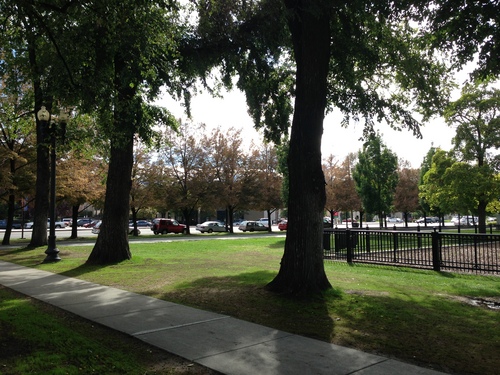This is an archived article that was published on sltrib.com in 2014, and information in the article may be outdated. It is provided only for personal research purposes and may not be reprinted.
Salt Lake City has been rolling out a new strategy to deal with homelessness around Pioneer Park that officials say emphasizes the carrot over the stick.
The centerpiece of that strategy is the police department's new Metro Support Bureau Resource Center at 420 W. 200 South, directly in the heart of the city's homeless population.
Police officers at the resource center will be joined by service providers who can help the homeless with the wide array of problems that afflict them.
"If we are beating everything in the area with the police stick, which is simply jail, then we are doing a disservice to this community and to all members of our society," said Salt Lake City Police Chief Chris Burbank during a Tuesday news conference. "In fact, we are better served when we consider alternatives to incarceration."
Still, the department's arrest statistics suggest that police have not completely disavowed the stick. Even as Burbank lauded the city's new homeless initiatives — additional housing units coupled with programs to treat mental illness and drug addiction — the chief noted that the department made 423 arrests in the Pioneer Park area between July 7 and August 8, a jump from last year.
But Burbank insisted that police are striking a balance, aggressively pursuing serious criminals while ensuring people who are simply down on their luck aren't being harassed by police.
"What we're looking at is identifying those individuals who are the root of the problems, and they're problems for everybody, and then taking those individuals out of the equation," Burbank said.
Echoing Burbank, Mayor Ralph Becker said that far from criminalizing homelessness, the city wants to direct homeless people in need of help to services rather then sending them to jail.
"The important thing is to just embed in all of us who work with the homeless, including our law enforcement officials, to commit to not treating the homeless population as criminals, because they're not," Becker said.
"It doesn't mean there aren't criminals among the homeless, but our homeless population are folks who have, for a whole variety of different reasons, had a really tough time in their lives," Becker added.
Officers are being discouraged from arresting homeless people for minor misdemeanors, Burbank added.
"Jail is not the best answer for drugs and alcohol addiction. We have service providers with much better opportunities and chances for them to be successful," Burbank said.
Among those service providers are the nonprofits Volunteers of America and The Road Home, both of which have offices near Pioneer Park. The nonprofits are spearheading a new outreach program that seeks to direct homeless people with mental illness or drug addiction to treatment programs.
The city also will be providing more housing for the homeless as part of its "housing first" approach, which has gained currency in many American cities in recent years.
"Housing is the ultimate goal for Salt Lake City in homeless services," said Liz Buehler, who in November became the city's first Homeless Services Coordinator.
In the next 18 months, the city wants to find housing for the 20 people who most use homeless services, with a final aim of building 300 housing units for homeless individuals and their families, Buehler said.
Twitter: @Harry_Stevens



